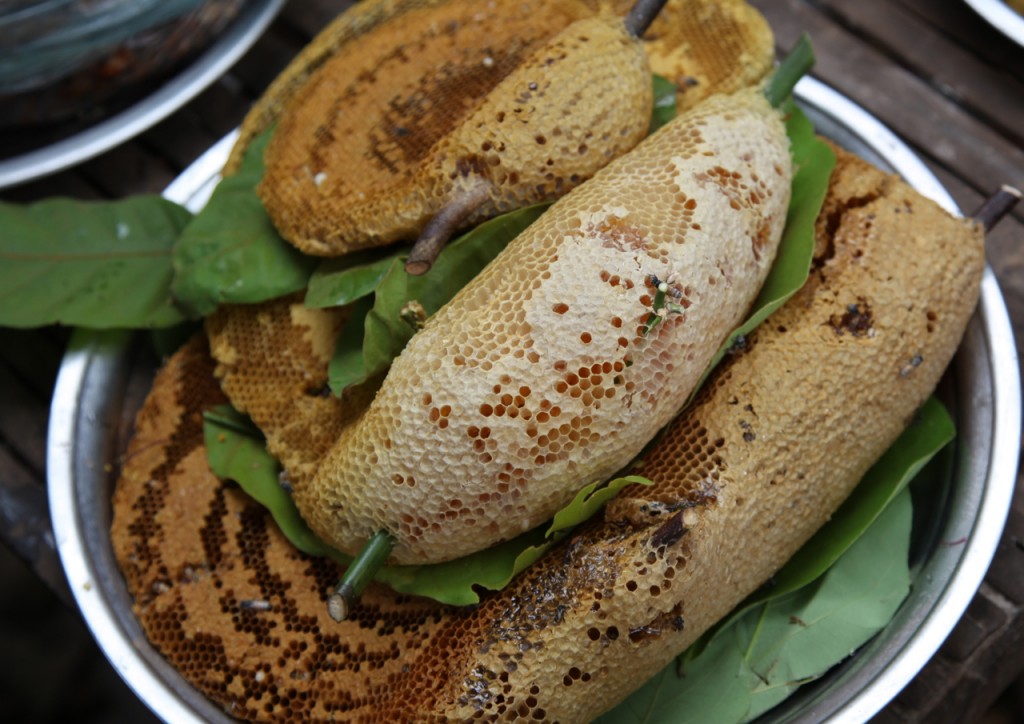The Forest Law of 2002 provides a legal basis for rural communities to use and help manage forests through community forestry. The 2003 Sub-decree on Community Forest Management sets out rules for the establishment, management and use of community forests in Cambodia.
Community members collect timber and animal and plant-based forest products seasonally, including construction materials and foods.

Wild honey harvested in a community forest. Photo by ODC, taken on October 2014.
The Ministry of Agriculture, Forestry and Fisheries has general jurisdiction over management of community forests.
Community forests are state public property1 – this land cannot be sold or granted as economic land concessions (ELCs). The Forestry Administration (FA) has the right to identify community forest boundaries.
Local communities can submit a request to the FA for a community forest to be recognised.2 Under the sub-decree, a Community Forestry Community (CF Community) is a community that voluntarily initiates to form a group under a Community Forest Agreement to conduct development activities and use community forest resources in a sustainable manner.
International NGOs and donor bodies and national NGOs have often initiated or promoted community forests.3
The ODC dataset for community forests lists 337 different forests. There is a vast range of sizes, with a handful being less than 10 hectares and one over 5000 hectares.
The timber and non-timber forest products (NTFPs) harvested include food and animal fodder, resin, medicines and construction materials, animals and animal products, for family consumption and domestic trade. One study found resin products were the largest source of income in one community forest, followed by honey and beeswax and live animals.4
Another study of community forestry across several Southeast Asian countries5 found that it has the potential to play a role in alleviating poverty, but for this to be effective:
- illegal logging and forest sector corruption must be controlled
- community forestry sites must be located where there are abundant forests
- forest income must be boosted through improved access rights, tenure, and benefit sharing, and removal of anti-poor regulations.
REDD+ projects
The Cambodian government launched a pilot REDD+ projects in the Oddar Meanchey community forest in May 2008. REDD+ stands for Reducing Emissions from Deforestation and forest Degradation. It is a global project working to reduce greenhouse gas emissions from logging and to promote sustainable forest management. Unfortunately there were initially some negative impacts on indigenous and forest-dependent people,6 but action has been taken to mitigate these.
Last updated: 22 September 2015
Related to community forestry
References
- 1. Sub-decree on Community Forest Management 2003, Article 3.
- 2. Sub-decree on Community Forest Management 2003, Article 6
- 3. “Community forestry in Cambodia”, Ly Chou Beang and Lao Sethaphal, Proceedings for the regional workshop on forests for poverty reduction, FAO.
- 4. “Assessment of non-timber forest products in Phnom Kok community forest, Cambodia”, Sophanarith Kim, Nophea Sasaki, Masao Koike, AEJ (2008) 6:345–354
- 5. “Poverty alleviation through community forestry in Cambodia, Laos, and Vietnam: An assessment of the potential”, William D. Sunderlin, Forest Policy and Economics, Volume 8, Issue 4, June 2006, Pages 386–396
- 6. “REDD Policy Monitoring Project.” Accessed 23 April 2015. http://www.ngoforum.org.kh/index.php/en/redd-policy-monitoring-project

